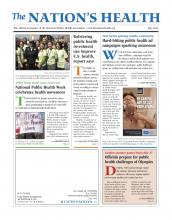Across the nation, the 2012 National Public Health Week theme of “A Healthier America Begins Today. Join the Movement!” rang loud and clear through hula-hoop demonstrations, lunchtime walks, health fairs and an array of other public health events.
In Little Rock, Ark., National Public Health Week events kicked off Monday, April 2, with a news conference and planting demonstrations at Oak Forest Conway-Curren Park. The following day at the Butterball Health Fair in Madison County, a brown bag luncheon featured a discussion of cigarettes as part of Alcohol, Tobacco and Other Drugs Awareness Day. Wednesday’s events included an evening broadcast on teen pregnancy by the Arkansas Educational Television Network and a National Start Walking Day event in Little Rock and North Little Rock featuring an appearance by mayors from both municipalities on the Clinton Park Bridge.

The 18th Annual Peace Day in Irvine, Calif., encouraged children to turn in toy guns and violent video games.
On Thursday in the Arkansas Department of Health auditorium, a grand rounds focused on “Chronic Disease, A New Approach.” The group Closing the Addiction Treatment Gap issued a report on Friday outlining the status of substance abuse treatment in Arkansas as well as recommendations for future outreach and response.

Events at the Chicago Lighthouse for People Who are Blind or Visually Impaired included a community walk and exercises.
In Irvine, Calif., the 18th Annual Peace Day attracted hundreds of participants on the first day of National Public Health Week. The event, sponsored by the International Health & Epidemiology Research Center in Sherman Oaks, Calif., gave children the opportunity to voluntarily turn in toy guns and violent video games in exchange for certificates and awards. Children who did not own a toy gun were encouraged to draw or write something about healthy attitudes, non-violence and peace and also received certificates. The goal of Peace Day is to educate, raise awareness and inform children and youth about violence, especially gun violence.
“We believe strongly that we can be healthy physically, mentally and emotionally and in a good state of well-being only if we live in an environment with no violence, no injury and no fear,” said APHA member Farideh Kioumehr, DrPH, DVM, founder and executive director of the center. The center works to reduce and eventually eliminate gun deaths and gun-related injuries, promote safety awareness and create a healthier, safer, violence-free and injury-free America and world.
Sponsored by the Los Angeles County Department of Health in Los Angeles, Calif., and the City of Los Angeles, National Public Health Week came alive with musical entertainment, demonstrations, free health screenings, information booths and giveaways at an expo in El Pueblo de Los Angeles on April 5.
Mariachi musicians played festive music for the crowd, and the stage also featured a self-defense demonstration and a puppet show on earthquake safety. The event also included a kids’ cook-off, blood drive, child fingerprinting and handouts of free recipe books. Health workers offered free screenings for allergy, asthma, blood pressure, cholesterol, glucose, body mass index and HIV and other sexually transmitted diseases.
Attendees were given a “Passport Card” with a list of the more than 40 exhibitors providing information on important public health topics such as tuberculosis, immunization, injury and violence prevention, physical activity and emergency preparedness. Attendees who obtained all the required stamps on their cards claimed two prizes: a “Be a Germbuster” activity book and an individual-sized container of hand sanitizer.

An information table and jump rope demonstration by public health students at San Diego State University.
The Health Expo 2012 drew almost 1,000 people, which health officials said was the best turnout yet for the annual celebration. The expo demonstrated the wide range of services and information available to the Los Angeles community and gave attendees the chance to meet public health experts who could answer questions or refer them to services.
The San Diego State University Graduate School of Public Health Student Council in San Diego, Calif., set up an information table at the center of campus during National Public Health Week. Staffed from 11 a.m.–3 p.m. each day when foot traffic was highest, the focus was to promote National Public Health Week and educate students, faculty, staff and visitors about healthy living and disease prevention.
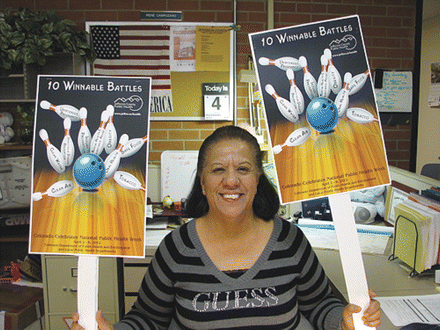
Staff at Jefferson County Public Health in Lakewood, Colo., focused their activities around winnable health battles.
Putting a creative twist to each day’s theme, graduate students engaged the audience through incentives. For example, Monday’s theme of “Promoting Healthy Eating and an Active Lifestyle” kicked into gear with the distribution of healthy recipe cards and student-led exercises such as a jump rope session in front of the table. Participants were awarded with their choice of a mandarin orange or bottle of water.
The students put Tuesday’s theme of “Alcohol, Tobacco and Other Drugs” into action by educating passersby about the adverse health effects of secondhand smoke and the environmental toxicity of tobacco from cigarette butts. Students also were encouraged to sign up for San Diego State University’s third annual Toxic Butt Clean-up later in April.
Students staffing the table on Wednesday highlighted the “Preventing Communicable Diseases” theme by handing out brochures, pamphlets and workplace posters on healthy behaviors to prevent seasonal influenza and by demonstrating how to properly cover your sneeze or cough.
Thursday’s theme of “Reproductive and Sexual Health” gave the students a chance to talk about safer sex via information on sexually transmitted diseases and distribution of free condoms sculpted into a rose. Attendees at a Graduate School of Public Health Student Council-hosted fundraiser received day passes to the campus recreation center to spotlight Friday’s theme of “Mental and Emotional Well-Being.”
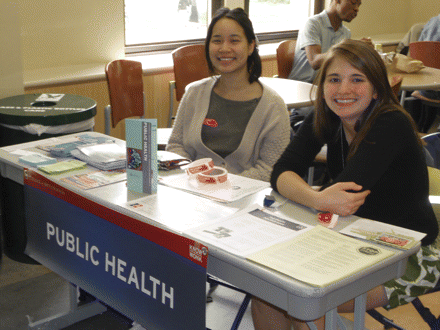
American University in Washington, D.C., raised awareness of the school’s new undergraduate public health program.
On April 4 of National Public Health Week, Jefferson County Public Health staff in Lakewood, Colo., joined in a walk with U.S. Surgeon General Regina Benjamin, MD, MBA, at the Colorado Center for Health and Wellness. A “10 Winnable Battles” poster created by the Jefferson County Public Health’s Health Communications Office and adopted as the Colorado Public Health Week poster was popular at the event. The poster pictured a bowling ball knocking down pins that represented public health topics such as clean air, safe food and obesity.
At a Public Health Champions Luncheon on April 5, the Jefferson County Board of Commissioners and Jefferson County Board of Health honored the 2011 Public Health Champions of the Year. Jefferson County Public Health’s Communications Program created the event 15 years ago, and it continues to promote and educate about public health initiatives while also celebrating the people who have contributed to public health in the county. The initiatives touched on topics such as pool safety, health in schools, injury prevention, improving the built environment and protecting citizens against the dangers of tobacco and secondhand smoke. Also promoting the “winnable battles” theme, the Jefferson County Public Health annual report was released during National Public Health Week and included as an insert in the local community paper.
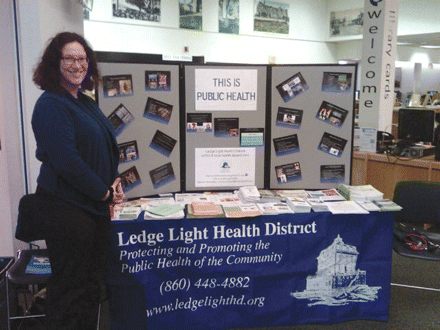
The Ledge Light Health District in New London, Conn., worked with local libraries to promote health and provide information.
The Ledge Light Health District in New London, Conn., celebrated National Public Health Week by partnering with local libraries to promote public health. The Ledge Light Health District is the local health department for the towns of East Lyme, Groton, Ledyard, New London and Waterford. Staff members spent time at each town’s library during National Public Health Week talking to residents about public health. Display boards included basic public health information and descriptions of the services provided by the health department. Staff also distributed fliers and other materials that covered public health issues such as lead poisoning, substance abuse and prevention.
Some New London residents told health district staff they did not know what makes public health different from medical health. Others said they only associated restaurant inspections with public health and did not know what else public health professionals do. Many said they were surprised to learn how much public health affects their everyday lives.
At Florida International University in Miami, Fla., National Public Health Week activities began early with a campaign called the “Economics of Good Health.” A team with the Stempel Public Health Association, which is part of the Robert Stempel College of Public Health and Social Work, aimed to educate students about the importance and cost-effectiveness of prevention.
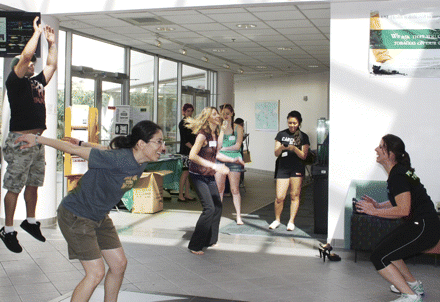
The University of South Florida held a range of events, such as a health education fair.
Photo courtesy Ellen Kent
“We not only created a greater sense of awareness on campus about public health, but we also managed to bring together different on-campus organizations, including FIU’s University Health Services,” said student Karen Iglesias, who is president of the Stempel Public Health Association. “We also brought together undergraduate students, master’s students, PhD students and event alumni to make this event successful. As a result of our campaign, we have had more students interested in public health and our program at FIU.”
The Stempel Public Health Association organized an event for each day of National Public Health Week, beginning with a kickoff event on Monday carrying the theme of “Active Living and Healthy Eating.” The goal of the event, which included hula-hoop games, healthy food, music and prizes, was to encourage students to ask questions and learn about the importance of public health and healthy eating. Tuesday’s event was co-hosted by University Health Services and focused on alcohol awareness. Students put on goggles that simulated the effects of intoxication and were asked to attempt walking a straight line to understand how alcohol impairs a person. The event highlighted statistics on the cost of alcohol-related crashes.
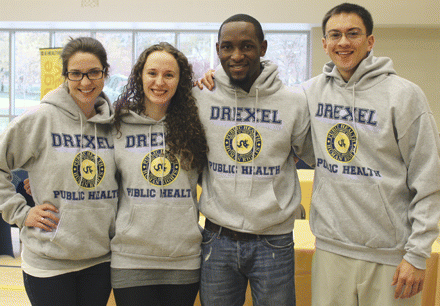
Students at Drexel University School of Public Health in Philadelphia held webinars and a health fair and blogged.
On Wednesday, the Stempel Public Health Association partnered with the Delta Omega Honorary Society in Public Health to tackle the importance of hand-washing to prevent communicable diseases. At the university farmers market, students and alumni handed out statistics and pamphlets and spoke to fellow students about public health. On Thursday, the association partnered with undergraduates from Vox, a Planned Parenthood-associated organization at the university, to host a game of sex jeopardy. Students asked questions and became involved with public health issues. The event also included free condoms and the promotion of university services for HIV and STD testing. At Friday’s Student Day, students, faculty and the public health dean joined to hear guest speakers talk about mental health. Food, prizes and music added a celebratory air to the gathering.
The University of South Florida College of Public Health in Tampa, Fla., collaborated with university and community partners to offer a variety of National Public Health Week events, kicking off with a celebration of “A Healthier America Begins With You.” Students led the campus community in fitness activities, distributed information on healthy habits and registered participants for the community-wide initiative “Walk to the Moon,” designed to encourage physical activity. Attendees also enjoyed playing the College of Public Health’s “Public Health is Your Health” game, with prizes and healthy snacks.
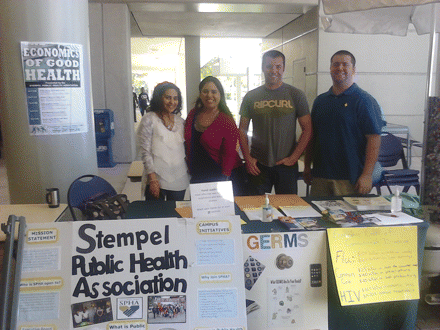
At Florida International University in Miami, students organized an event for each day of National Public Health Week.
Student research and academic success were showcased at the college’s annual National Public Health Week Awards Ceremony, which included the 2012 Delta Omega Honorary Society in Public Health inductees, Outstanding Professor of the Year and the Florida Outstanding Woman in Public Health. More than 70 students attended a networking fair and met with a variety of public and private health organizations in search of research ideas, internship possibilities, employment and volunteer posts and general information on career options in public health. Graduate students also presented their research posters during a campus-wide research symposium organized by the University of South Florida Graduate School.
Throughout National Public Health Week, the University of South Florida Health Service Corps organized volunteer activities for public health students to enjoy while making a positive difference in the community. Events included a community health fair for migrant farmworkers and their families, where public health students contributed with health education and fitness activities for children and adults. During a middle school health education fair, public health students partnered with other University of South Florida students and community experts to introduce youth to safety, fitness, nutrition, smoking prevention and health career topics through a variety of interactive learning stations.
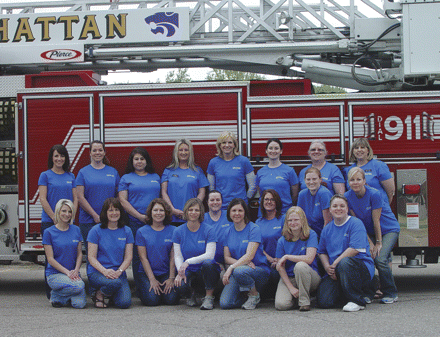
The Riley County Health Department’s week-long health fair in Manhattan, Kan., included displays of emergency vehicles.
“Give Life Day” offered members of the campus community the opportunity to donate blood and to register for the National Marrow Donor and Donate Life Florida programs. Public health, nursing and medical students treated residents of the American Cancer Society’s Benjamin Mendick Hope Lodge to a Spring Fling Dessert Party topped off with a game of Chinese checkers.
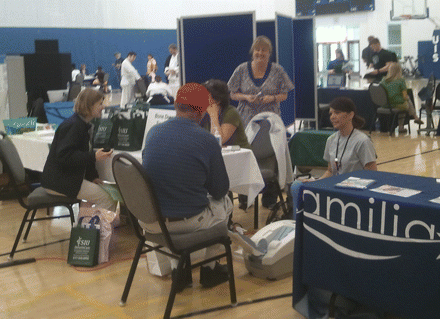
The University of Illinois at Springfield Campus Health Service held its annual Health Awareness Day on April 4.
The Hawai’i Public Health Association in Honolulu, Hawaii, held two National Public Health Week events to honor local public health professionals, volunteers and students. On April 2, more than 50 people attended the first National Public Health Week Mixer at a local Thai restaurant, yielding more than 20 new memberships and providing a relaxed and fun atmosphere to bring Maui’s public health workforce together. On April 4, more than 100 people attended the Hawai’i Public Health Association’s annual Oahu National Public Health Week Mixer. The event featured giveaways, information on the Hawaii State Health Department’s new strategic plan and an announcement of the University of Hawaii’s plan to rebuild the School of Global and Community Health. The mixers were co-sponsored by Hawaii Pacific Health, United Healthcare, Oahu Medical Reserve Corps and the University of Hawaii’s School of Public Health Alumni Association.
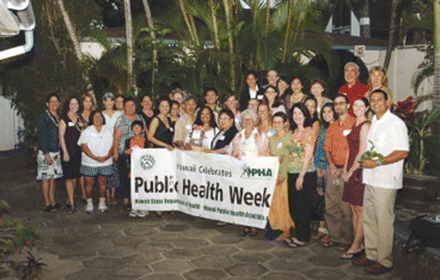
Events in Hawaii included a National Public Health Week mixer, with giveaways and public health information.
On April 3, the Gamma Chapter of the Delta Omega Honorary Society in Public Health presented the second annual Distinguished Lecture and Induction Ceremony with a talk on “War and Public Health: Untold Consequences of the 2003 War with Iraq.”
“Healthy People 2020: Meeting the Challenge” was the theme for the 2012 Robert D. Russell Symposium held April 4 at Southern Illinois University at Carbondale in Carbondale, Ill. The Department of Health Education and Recreation and the student-led Alpha Alpha Chapter of the Health Education Honorary Eta Sigma Gamma hosted the event, which included faculty presentations, a student poster session, a social, campus tour and the Russell Scholar Address. Presentations touched on topics such as health literacy among youth, barriers to physical activity for college students and influences on health status of urban youth. The keynote address included a historical overview of the infamous U.S. Public Health Service syphilis study conducted in Tuskegee, Ala., and the broad concepts surrounding bioethics in public health research.
The Chicago Lighthouse for People Who are Blind or Visually Impaired in Chicago, Ill., a social service agency, celebrated National Public Health Week with a series of special events, including a community walk, stretching exercises and motivational talks. The organization participates in National Public Health Week every year to promote healthy lifestyles for its staff and program participants.
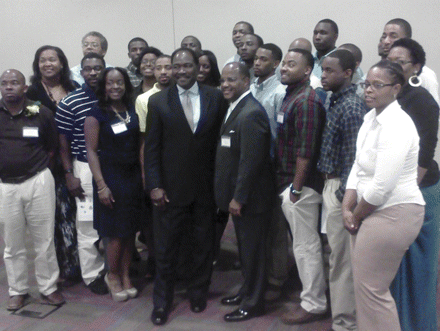
Participants and attendees at a symposium held at Southern Illinois University in Carbondale.
Photo courtesy Shannell McGoy
Maria Cuevas, a former intern who is visually impaired, gave a talk on her successful run in the Chicago Marathon and shared her plans to run in the event again in October. Also during the week, the organization hosted an American Red Cross emergency preparedness session to build awareness of public safety and acknowledge the work being done by occupational therapists as part of Occupational Therapy Month, which was also observed in April.
The University of Illinois at Springfield Campus Health Service in Springfield, Ill., hosted Health Awareness Day on April 4 of National Public Health Week. The event at the school’s new Athletic and Recreation center highlighted many areas of health, including mental, spiritual, physical, nutritional and financial health. Maps gave attendees a guide to each vendor’s name, location and testing or health information provided. Free screenings included measurements of cholesterol, glucose, bone density, body mass index and blood pressure. Exercise demonstrations kicked off in the gym every 30 minutes, and other attractions included a dance team performance and Aikido demonstration.
A lunchtime speaker from the university’s Information Technology Department spoke about health apps that can be used in smartphones or tablets to help people reach their health-related goals. Most of the highlighted apps were free or cost 99 cents, and program attendees were offered free fruit, vegetables, cheese and crackers. A campus blood drive garnered more than 70 donations, including 19 from new donors. Health fair attendees were asked to complete an electronic evaluation and by doing so could win a pedometer, tote bag, gift cards from local stores, cookbook and other prizes.
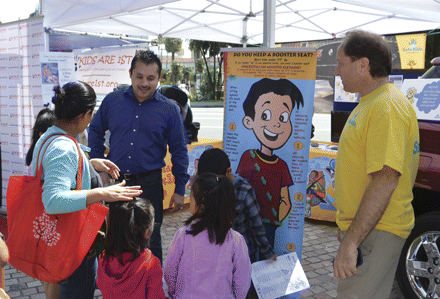
In Los Angeles, attractions at a health fair included information on booster seats. The event also included a kids’ cook-off, blood drive, child fingerprinting and free recipe books.
The Riley County Health Department in Manhattan, Kan., held a weeklong health fair to commemorate National Public Health Week. The health fair offered many opportunities for people to find out about their health and discover fun and reasonable ways to improve health. From April 10–13, the health department clinic was open each morning from 7 a.m.–8:30 a.m. for health testing. No appointment was necessary, and tests included cholesterol, thyroid, hemoglobin and white cell count, prostate cancer, cardiovascular inflammation, body mass index and diabetes monitoring. On themorning of Saturday, April 14, participants picked up their blood test results, enjoyed a free, heart-healthy breakfast and learned about healthy opportunities available in the community. Saturday’s fair also included a farmers market and displays of emergency vehicles.
In Wichita, Kan., the Sedgwick County Health Department and Sedgwick County Human Resources co-hosted a Diversity Brown Bag event on Wednesday of National Public Health Week. Employees from various departments viewed episode five of the acclaimed “Unnatural Causes” documentary. The post-film discussion shed light on health policy, social determinants of health and the root causes of inequities that exist in the health outcomes of certain subgroups among the population.
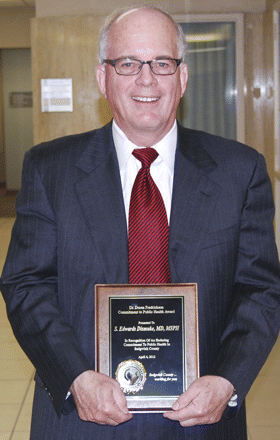
Ed Dismuke received a public health award in Wichita, Kan.
The Sedgwick County Health Department awarded the 2012 Dr. Doren Frederickson Commitment to Public Health Award to health leader Ed Dismuke at the county commissioners meeting.
As part of the Anne Arundel County Department of Health’s National Public Health Week celebration in Annapolis, Md., the department hosted a nature walk for employees and the public. More than 75 participants laced up their sneakers and walked the trails surrounding the Health Services Building.
At the Port Discovery Children’s Museum in Baltimore, Md., students enrolled in the Health Administration and Policy Program at University of Maryland–Baltimore County participated in “Healthy Saturdays” during National Public Health Week. The April 7 health fair was designed to inform and entertain children ages 2–10.
The students were assigned to groups and asked to choose from health topics such as nutrition, dental hygiene and flu prevention. To prepare for the schoolchildren, the students conducted research on their chosen topic and assembled tabletop displays with relevant, age-appropriate information. The college students also worked to make the displays interactive. For example, the physical activity table offered hula-hoops and jump ropes to demonstrate how being physically active can be fun.
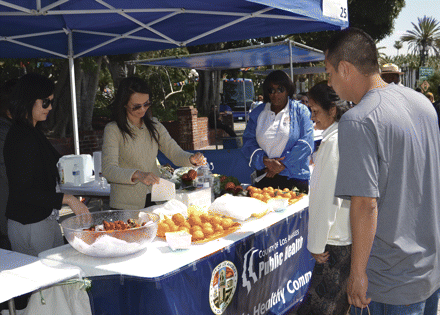
Free orange juice samples are offered at a community event held in the historic El Pueblo de Los Angeles on April 5.
“One could tell from the expressions on kids’ faces that they really enjoyed themselves and learned important health information during the process,” said André Stanley, MPH, instructor of the course and adjunct lecturer in the Health Administration and Policy Program at the University of Maryland–Baltimore County. “By the same token, the students enjoyed working with the kids and really appreciated how receptive they were to the information.”
In College Park, Md., the University of Maryland School of Public Health’s Center for Health Literacy and Health Center partnered to celebrate National Public Health Week by raising public health awareness in the university community.
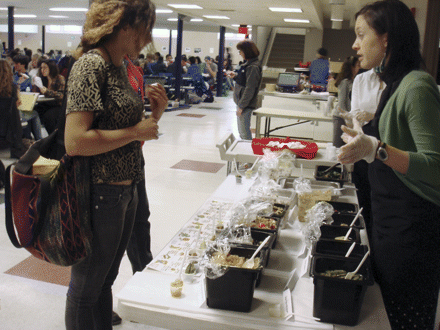
High school students sample healthy foods during an “Expand Your Palate” event held by officials in Brookline, Mass.
With the help of the student marketing organization known as the Stamp Street Team, the school relayed dozens of public health messages throughout the campus community. All of the messages were written in chalk on sidewalks, driveways and other outdoor areas. The messages included facts, statistics and general public health messages such as “Did you floss today?”
On April 3, the centers staffed a table at the University of Maryland Stamp Student Union. Many students, faculty and staff visited the table and played “Spin the Wheel” to earn a prize. Questions ranged from health literacy facts to the importance of brushing with fluoride toothpaste. Prizes and giveaways included toothbrushes, water bottles, granola bars and tissues.
Tufts Public Health in Boston, Mass., celebrated National Public Health Week by sponsoring a public health research and education program as well as a global health symposium. “Celebrating Public Health at Tufts University: Working Across Disciplines and Global Boundaries” featured a panel discussion on aging and health presented by faculty from the Tufts Friedman School of Nutrition Science and Policy, Cummings School of Veterinary Medicine, the schools of medicine, dentistry, engineering and arts and sciences and the U.S. Department of Agriculture’s Human Nutrition Research Center on Aging at Tufts.
To recognize both National Public Health Week and World Health Day, the Department of Public Health and Community Medicine sponsored “Pain: A Global Health Issue.” The symposium included several speakers who highlighted the global public health challenge of pain treatment, assessment of pain and effective pain management.
Food justice, healthy eating, hand-washing and cough etiquette for kids were just a few of the public health issues highlighted at events in Brookline, Mass., during National Public Health Week. Undergraduate community health students from Pine Manor College in Brookline went to multiple preschools and day care centers to teach young children to “Be a Germ Buster: Learn to Wash Your Hands and Cover Your Cough.”
On April 3, the ninth annual Hunger Banquet at Brookline High School focused on food justice. The previous day, questions about the relationship between diet and diseases were explored at the Brookline Senior Center with a talk on the role of diet in Alzheimer’s disease, cancer and heart disease. Attendees also learned how to integrate healthier eating into their daily lives.
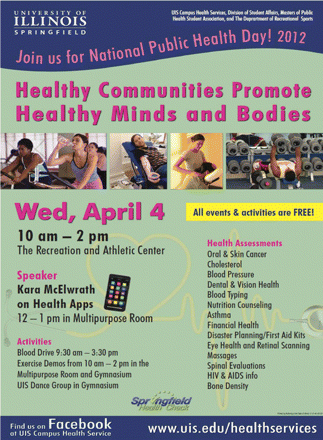
A flier promotes National Public Health Week events held on campus at the University of Illinois.
Brookline residents were offered a free workshop on emergency preparedness that explained when to “shelter in place” and how to create an emergency family communication plan. Brookline High School peer leaders organized Kick Butts Day on April 5, with a school-wide event promoting freedom from tobacco among teens. High school students, teachers and staff had the opportunity to taste healthy foods when Brookline’s School Food Services featured “Expand Your Palate” during lunch at the school. Some of the culinary delights offered that day included wheat berry salad, roasted fennel with cheese and spicy quinoa with red beans.
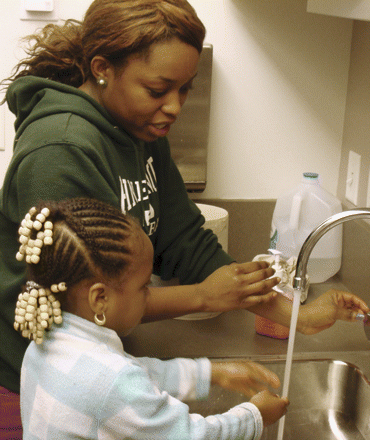
Community health students teach hand-washing tips to kids in Brookline, Mass.
As in previous years, the Brookline Health Department’s Environmental Health Section offered its popular online public health quiz. This year the quiz examined public health myths. The health department also held a rabies clinic during National Public Health Week to vaccinate dogs and cats.
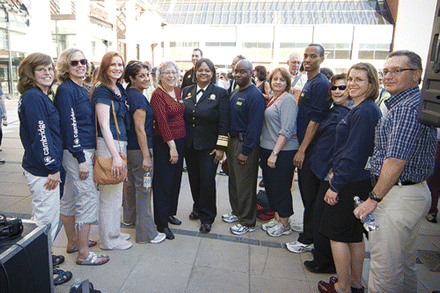
In Massachusetts, U.S. Surgeon General Regina Benjamin, center, is joined by Cambridge Public Health Department staff and Cambridge Mayor Henrietta Davis, on Benjamin’s right.
Photo courtesy Carla Osberg Photography
The Cambridge Public Health Department in Cambridge, Mass., kicked off National Public Health Week early with a visit from U.S. Surgeon General Regina Benjamin, MD, MBA, in late March. Benjamin’s advocacy for the National Prevention Strategy set the tone for the city’s National Public Health Week activities.
On March 22, health department staff and 250 others joined Benjamin for a walk through the technology hub of Cambridge and heard her speak about how walking and physical activity are being integrated into urban environments. The following day, Benjamin spoke at a ceremony celebrating the award of a federal Community Transformation Grant to Middlesex County municipalities, including Cambridge.
On April 4, the Cambridge Public Health Department and Institute for Community Health hosted the ninth annual “Real World Public Health” symposium designed to educate and excite the next generation of public health professionals about governmental public health. More than 50 public health graduate students studying in the Boston area attended the forum, which featured interactive workshops on head injury, health disparities and cultural competency as well as a career panel and networking lunch. The Cambridge Public Health Department also created its annual National Public Health Week poster gallery, which was on display through April 20 at Cambridge City Hall, Cambridge Hospital and the public health department. This year’s exhibit focused on achieving better health through effective policies, excellent programs, strong partnerships and citizen empowerment. Poster topics included smoke-free housing and the Cambridge Food and Fitness Policy Council.
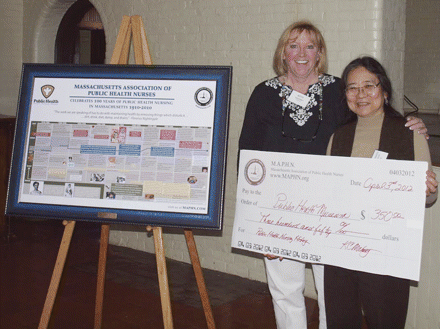
Kitty Mahoney, left, of the Massachusetts Association of Public Health Nurses, provides a check to a representative of the Public Health Museum during an event on April 3.
Photo courtesy Caroline Kinsella
Public Health Nursing Day was held at the Public Health Museum in Tewksbury, Mass., during National Public Health Week, highlighting health successes such as immunization. The Massachusetts Association of Public Health Nurses presented “100 Years of Public Health Nursing in Massachusetts,” and public health nurses invited their partners from the Massachusetts Association of Occupational Health Nurses and Massachusetts School Nurse Organization. The overall program during Nursing Day examined the role of public health nurses in vaccine preventable diseases.
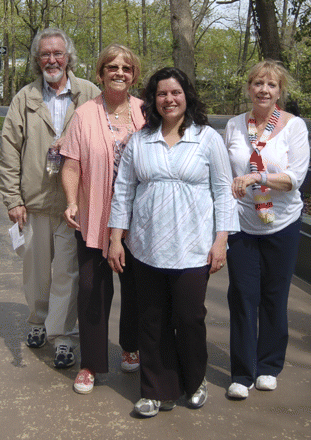
More than 75 people walked trails around the Health Services Building in Annapolis, Md.
Photo courtesy Elin Jones
The following day, the Massachusetts Association of Occupational Health Nurses celebrated at the museum with a program on “TB: A New Look at an Old Bug” and took a tour of the museum, including “iron lung” machines, or full-body respirators used by polio and tuberculosis patients unable to breathe without assistance. In conjunction with “Operation Stand Down,” the Massachusetts Association of Public Health Nurses collected donations of socks, travel size shampoo, nail clippers, soap, other toiletries and cash to be given to military veterans. Nurse and author Terri Arthur signed copies of her book “Fatal Decision: Edith Cavell, WWI Nurse,” a fact-based novel about a British nurse whose duties as a healer clashed with the military demands of an occupying regime during World War I. Sue Etkind, MS, RN, director of the Massachusetts Department of Public Health TB Division, was recognized on Monday of National Public Health Week at a museum-hosted event.
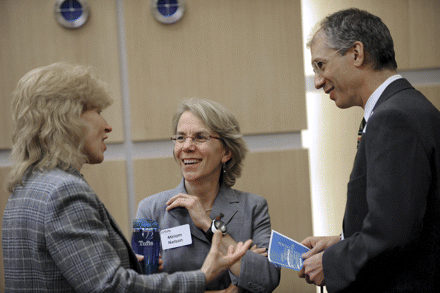
Tufts Public Health in Boston held a global health symposium. From left are Peggy Newell, provost ad interim; Miriam Nelson, PhD; and MPH Program Director Anthony Schlaff, MD, MPH.
Photo courtesy Tufts University Photography
The museum also promoted National Public Health Week on its website. Learn more about the museum, a nonprofit educational and cultural museum dedicated to preserving artifacts and records of the United States’ history in public health, at www.publichealthmuseum.org.
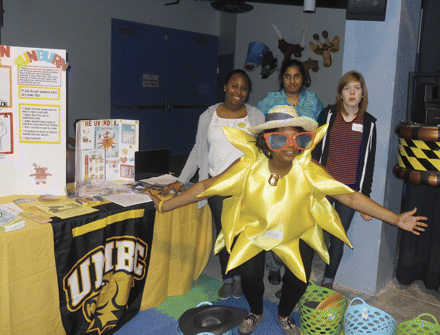
Students at the University of Maryland-Baltimore County held a health fair for kids that included information on sun safety.
Public health advocates in Michigan celebrated National Public Health Week with an awards ceremony in the rotunda of Michigan’s state Capitol in Lansing, Mich. Sponsored by the Michigan Public Health Week Partnership, the annual event culminated with the presentation of Hometown Health Hero and Health Policy Champion awards.
Nominations for the awards are solicited each year in February and March “from people all across the state,” said James Koval, MDiv, MPA, coordinator of the Michigan Public Health Week Partnership. “The partnership then determines winners from the nominations received. Awardees demonstrate significant accomplishments in the light of the National Public Health Week theme each year.”
During the April 25 event, 10 Health Policy Champion awards were presented to individuals, groups and organizations at the state and local level who work to maintain and improve the health of their local communities and the residents of Michigan in areas that impact public health policy.
In addition, 13 Hometown Health Hero awards were presented. The award recognizes individuals and organizations across the state that go above and beyond their normal work to maintain and improve the health of their local communities.
“Michigan has many people who are making a difference — one community at a time,” said Michigan Department of Community Health Director Olga Dazzo, MBA, as she opened the event.
A coalition of University of Missouri public health students from various health organizations across the campus in Columbia, Mo., hosted National Public Health Week events in coordination with campus resources. Monday, representatives from the Relationship and Sexual Violence Prevention Center provided information about sexual assault awareness. Tuesday’s focus was health literacy, with members of the Student Health Literacy Coalition, Health Professionals for Quality Care and other groups conducting patient simulations, an Easter egg hunt with facts and myths and an evening panel with practitioners and researchers. The importance of mental health was featured on Wednesday with a yoga lesson, breathing and stress management classes, a Qigong demonstration and suicide awareness and prevention tips. Thursday’s activities highlighted nutrition and physical activity. Wellness Center representatives, a dietitian and public health students engaged students during the day, and a group of Public Health Graduate Student Association members and public health students volunteered at the local food bank that evening, where they assembled packs of food. A food drive was held on campus all week. On Friday, peer educators from the Wellness Resource
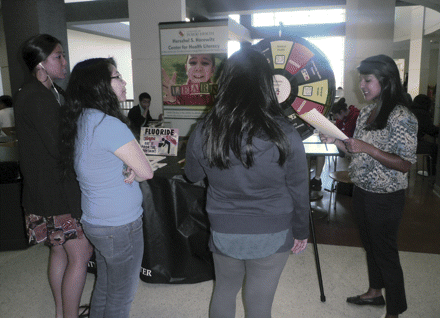
In College Park, Md., University of Maryland students raised public health awareness in the university community.
Center taught students about substance abuse, students distributed condoms with the Columbia Health Department’s Youth Advisory Committee at downtown bars and the inaugural members of the Delta Omega Honorary Society in Public Health, Gamma Eta Chapter, were inducted.
The Loup Basin Public Health Department in Burwell, Neb., promoted a health fair, poster contest and a “Walk @ Lunch” event to celebrate National Public Health Week.
The health department’s sixth annual “Spring Into Good Health” fair featured 25 health booths and free screenings such as glucose, hemoglobin, blood pressure and grip strength. Burwell Medical Clinic, Burwell Dental and Burwell Pharmacy served as fair co-sponsors.
All third-graders in the department’s health district were asked to make a poster about hand-washing. A winner from each school was awarded a Subway gift card, and the grand prize for the overall winner out of 127 posters was a 24-inch bike and $100 for the student’s school to purchase health education products. Later in April, the health department hosted a site for the Nebraska Blue Cross and Blue Shield’s “Walk @ Lunch” event. Participants, who received an LED flashlight, signed in at the Burwell pool and walked a designated route established around the park for approximately 30 minutes. Local businesses and schools joined in to help promote a healthy lifestyle through physical activity.
The second annual MINK, or Missouri, Iowa, Nebraska and Kansas, Conference rounded out National Public Health Week in Omaha, Neb. Held in cooperation with the University of Nebraska Medical Center’s College of Public Health and the Great Plains Public Health Training Center, the conference brought representatives from all four states together to attend presentations and panel discussions about advocacy, workforce development, membership recruitment, Public Health Accreditation Board certification and substance abuse and mental health.
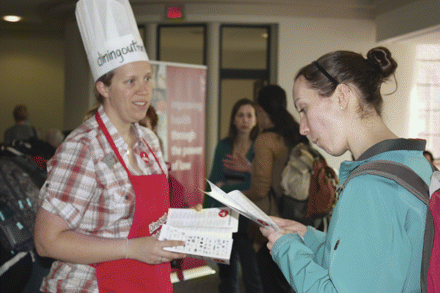
More than 1,000 people attended the University of Minnesota School of Public Health’s annual National Public Health Week Film Festival, watching movies and sampling healthy food.
Staff and volunteers with the Alliance Center for Independence in Edison, N.J., participated in a “Let’s Get Healthy Community Walk” during National Public Health Week. The center is one of 12 centers for independent living in New Jersey and assists people with disabilities in the counties of Middlesex, Somerset and Union. In addition to walking through the town of Edison while displaying National Public Health Week signs, center staff also posted valuable health tips on a Facebook page during the week. The staff and volunteers who participated in the walk during National Public Health Week have worked on continuing their good health by forming a walking group aimed at encouraging regular physical activity.
The University at Buffalo School of Public Health and Health Professions in Buffalo, N.Y., observed National Public Health Week with seminars offering new insights about two key global health issues.
The first, “Radiation Disasters: From Hiroshima to Fukushima,” looked at the fact that at least 100 disasters have occurred at nuclear power plants worldwide since the atomic bombings of Hiroshima and Nagasaki, Japan, in 1945. Many of those disasters have caused public health problems. The second seminar was titled “Why Don’t People Wash their Hands? Underestimating the Challenges to Motivating a ‘Simple Behavior.’” About 7.6 million children younger than age 5 die annually around the world, with pneumonia and diarrhea as the leading causes of death. The vast majority of those deaths are preventable, especially considering hand-washing with soap has been proven to decrease the prevalence of pneumonia and diarrhea by up to 50 percent in low-income areas, according to the seminar.
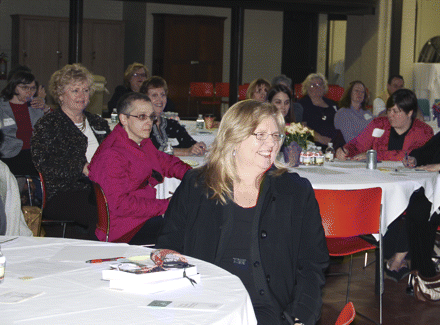
The Public Health Museum in Tewksbury, Mass., hosted events such as this meeting of public health nurses.
The Public Health Association of New York City, N.Y., celebrated National Public Health Week with a public health career forum. The forum addressed issues such as the types of public health careers and the best preparation for starting a career in public health. The forum, which featured a range of speakers, was held at the City University New York School of Public Health in East Harlem, N.Y.
Roger Hayes, who started his career as a community organizer in the 1960s and ended up as assistant commissioner for the East and Central Harlem District Public Health Office of the New York City Department of Health, noted that “many health conditions have deep roots in social inequities.” Succeeding in public health hinges on being a “flexible problem-solver,” being able to communicate well with different audiences and “having a good grasp of science, data and evaluation.”
Forum speaker Nicole Hollingsworth, president-elect of the Public Health Association of New York City, senior director of community and population health at Montefiore Medical Center in the Bronx, was another of the speakers at the career forum told attendess that “if this is the work you want to do, the Bronx is the place to do it.”
She told forum attendees one way to land a job with a nonprofit health organization might be to volunteer to write a grant application for the prospective employer. She said public health professionals need to be talkative, inventive and to like people and the community they serve.
Speakers participated in two breakout sessions during which public health students and new professionals had an opportunity to ask questions.
In Syracuse, N.Y., the Department of Public Health and Preventive Medicine at State University of New York Upstate Medical University organized several National Public Health Week events and activities focused on the themes of active living and healthy eating and mental and emotional well-being.
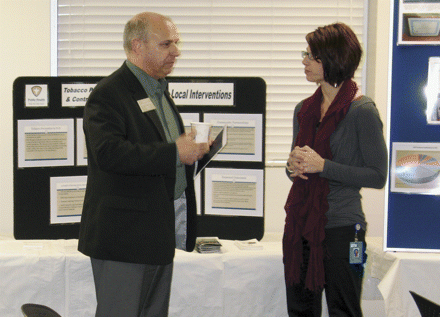
Fargo Cass Public Health in Fargo, N.D., celebrated National Public Health Week with a leadership breakfast and booths.
The university’s Lerner Center for Public Health Promotion hosted a free yoga class, a one-mile walk-run and a lunch-and-learn nutrition lecture. The Department of Public Health and Preventive Medicine continued the lunchtime lecture series each day for the remainder of National Public Health Week, with topics designed to promote healthy lifestyles such as exercise, healthy eating, yoga and learning to be at peace.
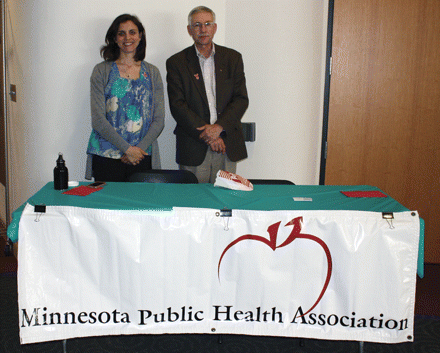
The Minnesota Public Health Association was part of an event with the state department of health that included lecturers.
On Wednesday, students in the Central New York Master of Public Health Program organized a children’s health carnival at Mary Nelson Youth Center. The event included activities and games to promote healthy living such as fruit and vegetable taste testing, nutrition education, yoga instruction and an obstacle course. A special weeklong menu was developed for the cafeteria at University Hospital and highlighted various aspects of nutrition such as a gluten-free day and a low-salt, low-sugar day. Vegetable Identification Day was designed to increase exposure to less- common healthy foods. Also, to improve mental and emotional well-being, a small dining area at the hospital — open to all employees, students and visitors — was transformed into a relaxation room for the week. The area had puzzles and board games as well as supplies for writing notes of thanks to veterans for distribution at the local Veterans Administration hospital and cards for patients at Golisano Children’s Hospital.
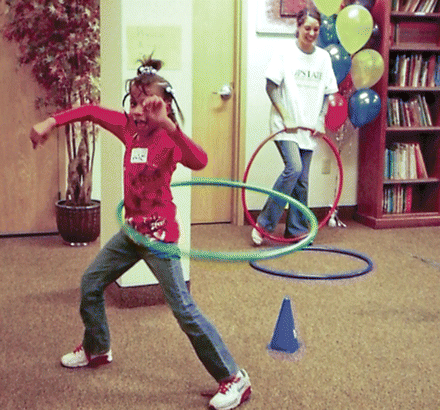
A child hula-hoops at a health carnival held by public health students in Syracuse, N.Y.
Throughout National Public Health Week, two displays containing information on public health were set up in high traffic areas of the SUNY Upstate Medical University campus. Participants said the combined efforts of faculty, staff and students made the department’s first comprehensive National Public Health Week celebration a success.
Members of Student Healthcare Executives managed a series of National Public Health Week events at the New York Medical College School of Health Sciences and Practice in Valhalla, N.Y. All events were located in the School of Health Sciences and Practice Center for Interactive Learning.
A lecture on “The Asthma Epidemic: Think Globally, Act Locally” highlighted the epidemiology of asthma, its increased incidence, risk factors and effective preventive measures. The second event introduced participants to the holistic theory and practice of Taiji and Qigong during a demonstration that also included meditative techniques. By the end of the night, participants tried “free-styling” Taiji and Qigong movements to Michael Jackson’s hit song “Don’t Stop ’til You Get Enough.”
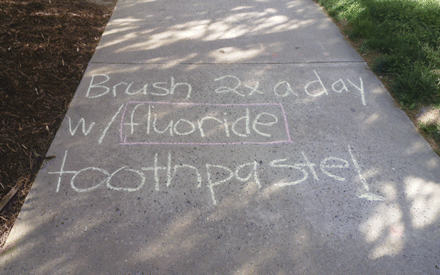
At the University of Maryland-College Park, health messages were conveyed on sidewalks.
On day three of the National Public Health Week celebration, the New York Medical College Physical Therapy Department invited attendees to “look good and feel great” by stopping by one of five stations to receive free services and recommendations. Services included a posture screening, information on workplace ergonomics, a pulmonary function test and measurements of blood pressure, heart rate and body mass index.
The following day, public health professionals in different fields led a panel discussion on public health careers. Panelists included a deputy health commissioner, an international public health advisor, a safety manager, an emergency preparedness manager and a director of physician practice management.
Students and administrators at the University of North Carolina at Chapel Hill Gillings School of Global Public Health in Chapel Hill, N.C., organized and led a series of National Public Health Week events.
Throughout National Public Health Week, the Minority Student Caucus and Delta Omega Honorary Society for Public Health sponsored a “Minority Health is…” interactive bulletin board encouraging students, faculty and staff to share their ideas and ideals of public health through images and words. On Monday, the Nutrition Coalition, a student organization that plans and carries out volunteer, social and educational health activities, held a farmers market at the Armfield Atrium.
Bringing a modern twist to Wednesday’s events, a flash mob of about 40 students danced at noon to Beyonce’s “Move Your Body” in support of first lady Michelle Obama’s campaign to combat childhood obesity. Anne Fitzgerald, a graduate student in health behavior, organized the flash mob.
“Mostly, I planned this so students could have some fun during a stressful time,” Fitzgerald said. “While many public health students are focused on getting populations to be more physically active, they often struggle with finding time to exercise, so this was a reminder that it’s something you can do spontaneously and with friends. It’s also just a great way to celebrate all those who practice, teach and study public health.”
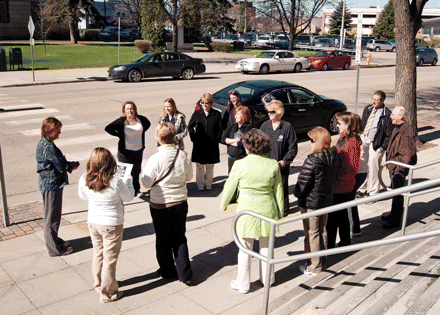
In Grand Forks, N.D., city and county employees were encouraged to take part in walk breaks that were offered each day.
Also on Wednesday, the Minority Student Caucus sponsored a “Taste of Gillings” healthy food fair and recipe exchange, where students prepared healthy dishes and shared them potluck style. Health behavior students then hosted a bone marrow registry conducted by “Be the Match.” More than 50 students registered and were entered into a database that connects volunteers with people in need of bone marrow transplants.
The University of North Carolina Department of Public Health Sciences in Charlotte, N.C., celebrated National Public Health Week with a range of activities.
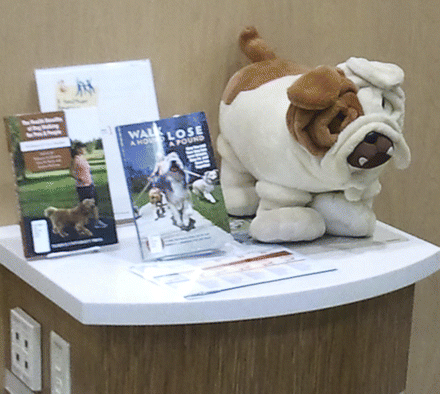
In Raleigh, N.C., open house visitors assessed whether a stuffed dog was overweight.
The week kicked off April 2 with a keynote address delivered by Leandris Liburd, PhD, MPH, MA, director of the Office of Minority Health and Health Equity at the Centers for Disease Control and Prevention. Liburd also participated in a radio show that day, and met with faculty and students in small groups to discuss CDC’s goals. In the evening, Liburd served as keynote speaker at an event hosted jointly by the university’s College of Health and Human Services and Blue Cross and Blue Shield of North Carolina. The discussion focused on “Saving lives, protecting people. Saving money through prevention.”
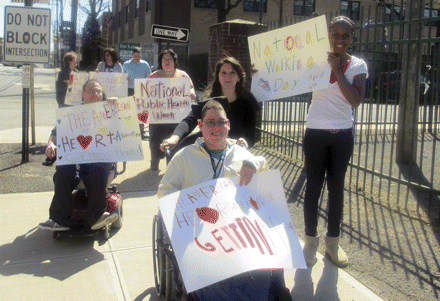
Staff and volunteers with the Alliance Center for Independence in Edison, N.J., show their National Public Health Week spirit.
On Tuesday, the university’s Department of Public Health Sciences hosted Kerry Burch, MPH, who coordinates Healthy Carolinians for North Carolina’s Mecklenburg County. Burch met with students for a “Lunch and Learn.” On Tuesday evening, the university’s Graduate Public Health Association hosted a public health sciences networking event at a local restaurant.
On Wednesday, the university’s Beta Phi Chapter of Delta Omega — the national public health honorary society — held its membership induction.
On Thursday, the Department of Public Health Sciences sponsored a panel discussion that featured students and community partners. The week’s events culminated Thursday evening with the membership induction ceremony of the Health Services Administration honor society Upsilon Phi Delta.
National Public Health Week kicked off early at North Carolina State University’s College of Veterinary Medicine in Raleigh, N.C. Starting with the college’s open house on March 31, dog lovers of all ages visiting the William Rand Kenan Jr. Library of Veterinary Medicine encountered an interactive display on the importance of walking for the well-being of both people and pets. Library Director Kris Alpi helped kids and their parents use a body condition score visual tool to assess whether Buddy, a stuffed bulldog, was dangerously overweight. Children guessed what their own pets’ scores might be and shared their ideas about what advice they as future veterinarians would give Buddy’s owners about exercise and diet to help Buddy become healthier.
More than 100 local children and their families interacted at the open house event with Buddy and browsed books on dog walking for health such as “Walk a Hound, Lose a Pound: How You and Your Dog Can Lose Weight, Stay Fit and Have Fun Together” and “The Health Benefits of Dog Walking for People and Pets: Evidence and Case Studies.”
Fargo Cass Public Health in Fargo, N.D., celebrated National Public Health Week with a leadership breakfast on Tuesday, April 3. Local city, county and congressional leaders enjoyed a healthy fruit and yogurt breakfast while visiting booths highlighting the health department’s programs and services. Fargo Cass Public Health Director Ruth Bachmeier, RN, gave a brief presentation on the past, present and future of public health in the community.
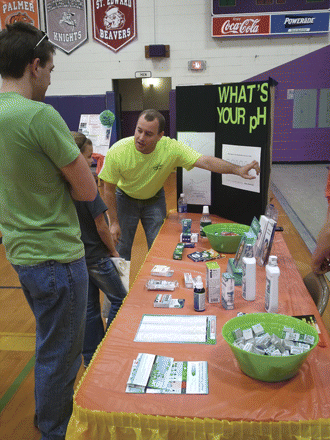
A health fair held by the Loup Basin Public Health Department in Burwell, Neb.
At the Grand Forks Public Health Department in Grand Forks, N.D., the importance of prevention and wellness to improve the community’s health was highlighted during National Public Health Week with walk breaks. Nearly 750 city and county employees were encouraged to attend walk breaks offered each day, which started at various locations within the city. Participants were quizzed on health-related trivia and awarded incentives. The 15-minute walk breaks were designed to give walkers an idea of how good it feels to get up and move, even for a relatively short time.
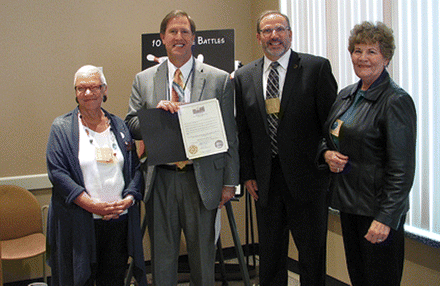
The Jefferson, Colo., County Board of Commissioners and Jefferson County Board of Health honored public health champions.
In Bowling Green, Ohio, the National Association of Local Boards of Health celebrated National Public Health Week with the 13th annual Ned E. Baker Lecture in Public Health, hosted by the Bowling Green State University College of Health and Human Services. The lecture was named in honor of National Association of Local Boards of Health founder and first president Ned Baker. This year’s topic was “Telling the Public Health Story — How to Affect Policy, Engage Elected Officials and Inspire Citizens.” The lecture is online at www.nalboh.org.
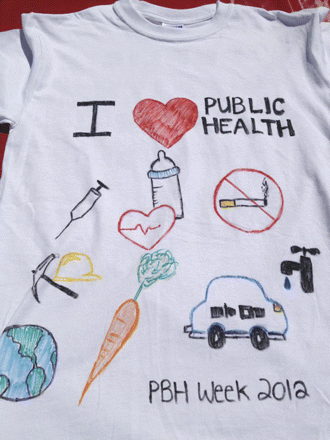
A homemade public health T-shirt created at an event held at the University of Texas at Austin.
The College of Public Health and Human Sciences at Oregon State University in Corvallis, Ore., celebrated National Public Health Week in large part due to hard work by students in the Oregon State University Public Health Club. Events focused on the preventive measures students and faculty can take to improve their lives and were split between participatory and awareness building.
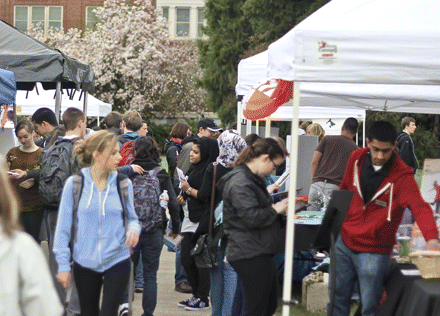
At Oregon State University, Healthy Habits Day brought together 18 organizations from the campus and community.
For example, on the participatory side, “Eat the Rainbow” encouraged people to track their healthy eating and incorporate more vegetables into their diet during the week. A free yoga class emphasized the strong connection between the physical body and mental and emotional well-being. A volleyball tournament and 5K run allowed participants not only to increase their level of physical activity but also to do so in a social and casual way.
Awareness was the focus of Oregon State University’s Healthy Habits Day. The school’s Public Health Club partnered with the OSU Center for Civic Engagement to bring together 18 organizations from the campus and community that support the health and well-being of everyone on campus. Groups included Counseling and Psychological Services, the Oregon State University Healthy Campus Initiative, OSU Recreation Sports, Student Health Services Health Promotion, the Student Dietetic Association and the OSU Craft Center. Each of the National Public Health Week daily themes was represented by at least one of the groups. The primary goal was to make the 25,000-member student body aware of the large variety of resources available to them on campus, allowing them to take small steps toward a lifetime of health and wellness.
Drexel University School of Public Health in Philadelphia, Pa., reflected the National Public Health Week theme of a healthier America through a series of events. On Monday, a webinar on “Careers in Health Disparities” featured a panel of experts from the university, community organizations and government. The goal was to connect public health undergraduate students with public health professionals. Tuesday featured the Philadelphia Global Water Initiative Conference: Performance Indicators for Sustainable Water and Sanitation Projects in Developing Countries. Also on Tuesday, Drexel students organized “Research and Policy in Reproductive Health: A View from the Trenches.” Two leaders in the field spoke on the history of women’s health and reproductive rights in the United States and current challenges as well as new areas requiring advocacy and research. A discussion following the presentation touched on how to make those issues more central in mainstream public health and what steps the Society for Family Planning and Women’s Law Project are taking to protect and further women’s and reproductive health.
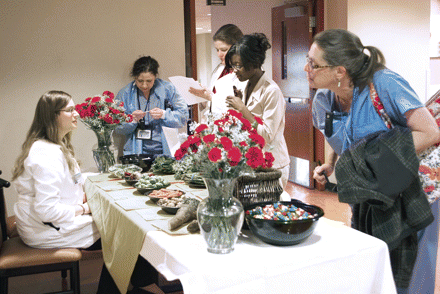
Events at the State University of New York Upstate Medical University included a Vegetable Identification Day.
A Health and Wellness Fair open to all students, faculty and staff on Wednesday featured free health screenings, massage therapy, fitness demonstrations and prizes and giveaways. The Drexel University School of Public Health staffed six tables run by the school’s Lesbian, Gay, Bisexual and Transgender Health Program; the Drexel chapter of Hep B Free Philadelphia; the Peer Preconception Group; Student Government Organization; Center for Public Health Readiness and Communication; and the School of Public Health.
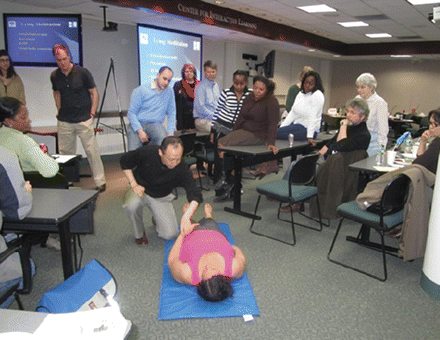
An event held by the New York Medical College School of Health Sciences and Practice.
Photo courtesy Student Healthcare Executives
Throughout National Public Health Week, full-time and executive master’s in public health students, as well as one doctoral candidate, blogged in accordance with each day’s topic. An associate professor and doctoral student also blogged about National Public Health Week for The Philadelphia Inquirer.
The Anderson County Health Department in Clinton, Tenn., kicked off its National Public Health Week events by handing out gardening kits to the first 100 children who visited the department. The kits contained vegetable seeds, a peat pellet for starting and growing a seedling and a health message about the importance of yearly medical checkups and eating lots of fruits and vegetables. Commissioner of Health John J. Dreyzehner, MD, MPH, encouraged all employees to walk during National Walking Day on April 4. Health department staff organized a healthy potluck lunch and provided upbeat music, encouragement and water to encourage all staff to get out and walk during the lunch hour.
Later in April, the health department co-sponsored a bike rodeo with the Knox Area Regional Bike Program to commemorate Earth Day. The event supported the National Public Health Week Theme of “A Healthier America Begins Today. Join the Movement!” by providing free helmet fittings, free children’s bike helmets provided by the Epilepsy Foundation, a safety talk, free bike checks and seat adjustments as well as a fun obstacle course and other bike activities at Bissell Park.
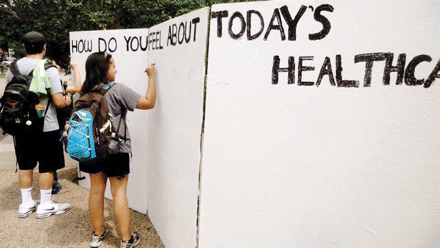
At the University of Texas at Austin, students were encouraged to share their thoughts on topics such as health care.
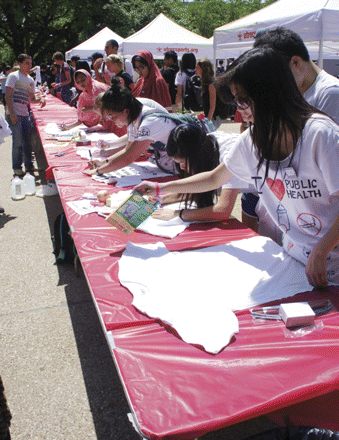
Students decorate public health-themed T-shirts at the University of Texas at Austin.
The Tennessee Public Health Association in Nashville, Tenn., marked National Public Health Week with Visionary Awards recognizing three public health leaders that make a difference in their communities’ health. For East Tennessee, the award went to Blount Benefits, a 30-member collaboration including Blount Memorial Hospital, Blount County Health Department, school health coordinators from three school systems and Blount Chamber Partnership which addresses childhood obesity in the region. The middle Tennessee award went to Sheila Bates for her “Cancer Queens” program that combines education and entertainment encouraging participants to treat themselves like queens and take charge of their health. For West Tennessee, the award went to Tony Geraci, executive director of Memphis City Schools Nutrition Program, for revamping the school lunch program to provide healthier options, including locally grown produce. He was the catalyst for the first farm-to-school meeting with growers and buyers in Tennessee and is a champion for healthy food service.
Texas Public Health, the University of Texas at Austin’s student organization for public health in Austin, Texas, celebrated National Public Health Week from Monday through Thursday with events such as a public health fair, a race, nation celebration and carnival, all designed to highlight the theme “A Healthier America Begins Today. Join the Movement!”

Students at Florida International University in Miami taught sexual health through an “STD Roulette” game.
Monday’s Public Health Fair featured 35 organizations from on and off campus and reached more than 500 students with the public health message. Tuesday was a challenge based on the “Amazing Race” television show, where the public health concentrations of environmental health, behavioral and social sciences, nutrition, infectious disease and microbiology and health law and policy took center stage. Prizes were awarded and nearly 200 participants finished the race.
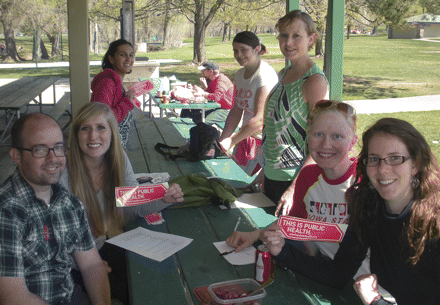
The Utah Public Health Association and its Utah Student Caucus held an Amazing Public Health Race for students.
Photo courtesy Utah Student Caucus
Wednesday’s public health celebration included live music, abundant cultural foods, performances and global health presentations. Thursday’s carnival, the most popular event, drew more than 600 participants and gave students a chance to play health-oriented games to win prizes. Texas Public Health worked throughout National Public Health Week to meet its mission to pique an interest in public health and encourage students through volunteering, networking with health professionals and leading health initiatives.
The Utah Public Health Association and its Student Caucus held an Amazing Public Health Race for public health students on April 3 of National Public Health Week in Salt Lake City, Utah. Teams of two raced around a Salt Lake City neighborhood using clues to find seven public health items and concepts and mark those with “This is Public Health” stickers. Items and concepts photographed with stickers included temperature-controlled salad bar food, warning signs about underage drinking, vaccination and swim diapers. Prizes were awarded to the teams gathering photo evidence the fastest, and several of the sites allowed the stickers to remain in place after the event, spreading the public health message beyond National Public Health Week.
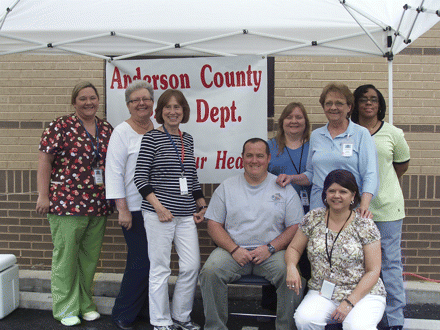
The Anderson County Health Department in Clinton, Tenn., held events such as a walking day and bike safety rodeo.
In Norfolk, Va., the local bicycle advocacy group Bike Norfolk organized Norfolk Bike Month to celebrate biking as an economical, environmentally friendly form of recreation that enhances productivity and overall health. The celebration had a physical activity theme and included a series of community bike rides, Bike to Work Week and BikeFest. BikeFest, a free event held on Norfolk’s waterfront, featured music, bike repairs, games, clinics and giveaways. Bike Month events were planned in collaboration with the Norfolk Department of Recreation and Department of Public Works, Seven Venues and the Norfolk Police Department.
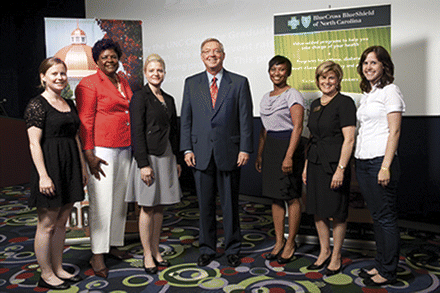
Events at the University of North Carolina Department of Public Health Sciences included a panel discussion.
American University in Washington, D.C., worked to raise awareness about public health and spread the word about the school’s new undergraduate public health program during National Public Health Week. Nearly 150 students, faculty and staff built on the “A Healthier America Begins Today. Join the Movement!” theme by kicking off the week with free Zumba classes offered by the on-campus fitness center. On Tuesday, students interested in public health careers learned about public health workforce needs and opportunities as part of a “meet and greet” led by the assistant director of the university’s public health program. The Center on Health, Risk and Society hosted a debate the following day led by the associate director of the Health Law and Justice Program of the American University Washington College of Law on the role of stigma in public health efforts.
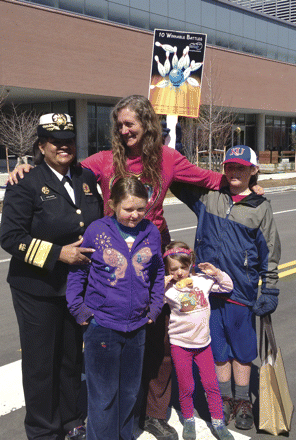
Surgeon General Regina Benjamin joins residents for a Colorado health walk.
Photo courtesy Kimberly Moore, APHA
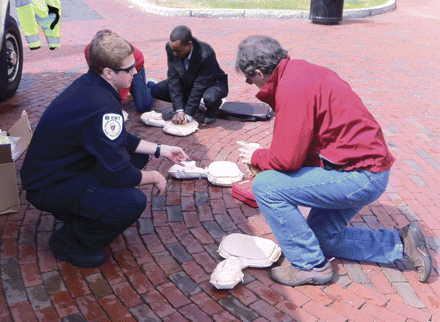
National Public Health Week events at Northeastern University in Boston included a compression-only CPR demonstration.
The Student Health Advisory Committee of the Student Government organized a Thursday Health Forum featuring a panel of campus representatives. Students raised issues and asked questions about health and public health. Students staffed a public health information table in the campus center lobby throughout National Public Health Week and distributed public health materials and answered questions. Public health messages also were posted throughout campus to highlight the variety of ways public health affects lives each day.
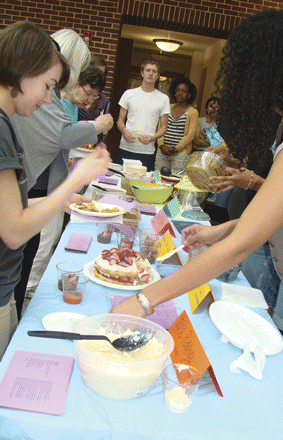
A Healthy Food Fair was held at the University of North Carolina at Chapel Hill.
Photo courtesy Rashida Moore
The Boys and Girls Clubs of Greater Milwaukee in Milwaukee, Wis., celebrated National Public Health Week with a series of wellness activities focusing on stress management, physical activity and nutrition. The days were named Make it, Don’t Fake it Monday, Take a Break Tuesday, Walk the Block Wednesday, and Thirsty Thursday, with Friday featuring a healthy recipe contest lunch social. On Monday, employees were encouraged to pack their own lunches instead of ordering fast food to avoid extra calories, fat and salt. Tuesday included a 30-minute work break to de-stress with relaxation exercises. Wednesday, employees were invited to join their co-workers in an afternoon walk as part of the American Heart Association’s National Walking Day. Thursday, employees could swap their soda for a healthier alternative and sample various healthy beverages during their lunch hours. Friday’s healthy lunch social included a salad bar and potluck dish exchange.
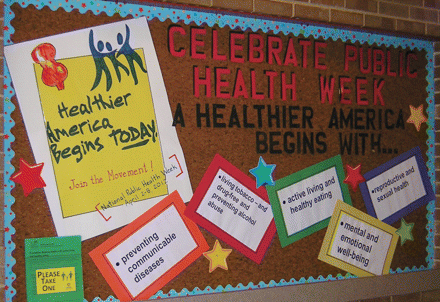
A National Public Health Week display in West Allis, Wis., promotes information on the week’s themes.
National Public Health Week went viral at the University of Wisconsin-Milwaukee’s Zilber School of Public Health. In conjunction with the Milwaukee, Wis., Health Department and the Wisconsin Public Health Association, a daily email called “Your Daily Dose” went out each day of National Public Health Week featuring information on the daily theme, a link to a “What is Public Health?” video, an invitation to forward the email or link to the video on Facebook and a “teaser” highlighting the student video contest that appeared in the Friday installment of Your Daily Dose. The student video contest, an initiative of the Wisconsin Public Health Association, awarded a free registration to the APHA Affiliate’s annual meeting for the video that best answers the question, “What is public health?”
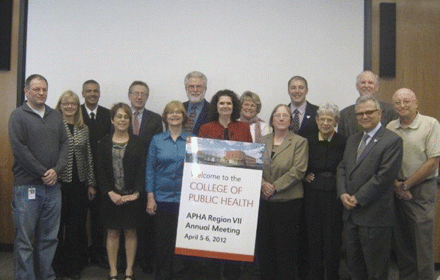
A conference in Omaha brought together public health workers from four states: Missouri, Iowa, Nebraska and Kansas.
Photo courtesy David Corbin
At the City of West Allis Health Department in West Allis, Wis., the Marketing Committee prepared a week of activities for the community. Health department visitors were greeted by a large bulletin board with five daily themes color-coded with a different color assigned to each day and a daily door prize drawing. Monday’s prize pack, reflecting active living and healthy eating, was a pedometer, healthy cookbook, health department flashlight and pamphlets and samples of spices. For Tuesday’s theme of “Alcohol, Tobacco and Other Drugs,” the prize pack included a carbon monoxide detector, stuffed puppy and information on asthma and the smoking quitline. Communicable disease awareness was the theme of Wednesday’s prize pack including a cold and flu kit, coffee mug and herbal tea, hand sanitizer, tissues and throat lozenges. Reproductive and sexual health was the focus of Thursday’s prize pack, which was represented as a candle, a bag of dark chocolates, sexually transmitted disease information and a health department flashlight. On Friday, the mental and emotional well-being prize pack included a journal, meditation book and stress-management booklet.
University of Memphis students take on distracted driving
Distracted driving was the focus of National Public Health Week outreach by the Public Health Student Association at the University of Memphis in Memphis, Tenn.
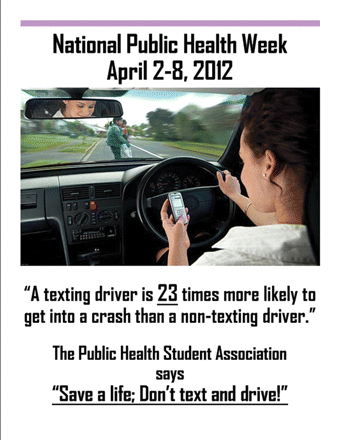
An anti-distracted driving ad from the student association
“One of our members even lost a loved one from a distracted driving accident, so this public health issue was of special interest to us,” said Kayla Larson, a master’s of public health student and president of the University of Memphis Public Health Student Association. “She shared her story with us, and we wanted the opportunity for others to share their stories as well.”
Students collected data on texting and driving from www.distraction.gov and created a poster with eye-catching facts and photos. Students placed the display at the school’s University Center in the center of campus, which has a high volume of traffic.
“We were pleasantly surprised to see how many students stopped to read the data and share their stories,” Larson said. “There were college kids of all ages and even some families in the center, due to incoming freshmen visiting.
“One young man talked to me about how he was once in a car accident while he was texting. He believed he could multi-task, but after his accident he changed his behavior and knew from that point on to put away his phone while driving.”
She said another student saw the display, expressed his interest in public health and wanted to join the student association.
“We may not have changed everyone’s attitudes, but we brought awareness to an issue that many people do not think about,” Larson said. “We even brought awareness to public health in general and its importance to society.”
The student association placed an ad in the school paper, The Daily Helmsman, during National Public Health Week. The ad featured a driver eyeing a mobile phone while a woman and child crossed the street in front of the car. The ad read, “A texting driver is 23 times more likely to get into a crash than a non-texting driver. The Public Health Student Association says, ‘Save a life; Don’t text and drive!’”
Northeastern University events target mental health, tobacco
Encouraging people to talk about mental health, promoting tobacco cessation and linking public health students with professional mentors were some of the National Public Health Week events at Northeastern University in Boston, Mass.
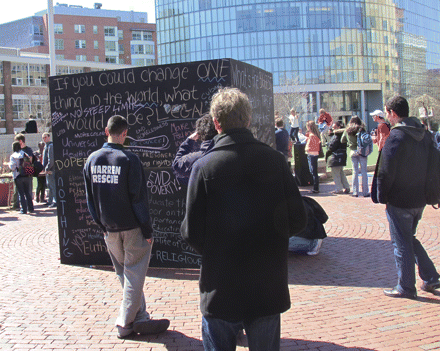
A large, box-shaped blackboard on campus at Northeastern University encouraged people to give feedback on health-related questions.
An on-campus display on “Revealing Mental Health Isn’t a Secret Disease” graced the windows of the Curry Student Center to bring light to mental health. The display was a combination of printed and handmade posters modeled after artist Frank Warren’s PostSecret project in which people mail him anonymous confessions written on postcards, and he displays those postcards online, in art museums and in his books. The campus display aimed to create awareness about mental health as a public health issue and allowed for anonymous submissions to allow “a cathartic exercise to release a little bit of what they emotionally hold in,” said Domenic Corey, vice president of the Health Disparities Student Collaborative. Students with the school’s collaborative staffed a table adjacent to the windows and distributed information about mental health services on campus.
At a Heart Health Fair on Monday of National Public Health Week, the Northeastern University Emergency Medical Services Interest Group taught compression-only CPR on the campus’ Centennial Quad. Students with the Health Disparities Student Collaborative partnered with Subway to promote tobacco cessation. To symbolize going “cold turkey,” students who handed over a pack of cigarettes or smokeless tobacco received a free turkey sandwich from Subway.
Also on Monday, the Northeastern University Police Department offered a Rape Aggression Defense, or RAD, class to female students to provide them with tools to help them avoid sexual assault. The session fit in with the public health theme of injury and violence prevention.
The following day, a Public Health-Urban Health Mentor Program catered to students interested in pursuing a public health career or a career that impacts urban health. Seven public health leaders volunteered their time to be matched with student mentees to talk about their jobs and to offer guidance. The goal was to develop mentor-mentee relationships that will continue long after National Public Health Week.
On Wednesday, a large blackboard placed in the middle of campus featured questions such as, “What do you think most affects your health?” and “How do you think public health can apply to your intended profession?”
Students, faculty promote public health at University of Alaska
National Public Health Week at the University of Alaska-Anchorage included an online video, mayoral proclamation, public health open house and wide variety of student-led activities, from a workplace session on office ergonomics to a talk to preschoolers on positive emotions.
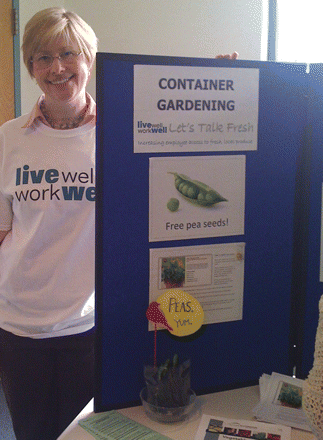
At the University of Alaska-Anchorage, one event had free sugar snap pea seeds.
The school’s Department of Health Sciences in Anchorage, Alaska, worked to promote public health throughout the week’s activities.
To kick off events, Anchorage Mayor Dan Sullivan signed a proclamation formally recognizing National Public Health Week 2012 in the city. Also, a video featuring the university’s College of Health’s interim dean, Bill Hogan, MSW, described each day’s events and was placed on the Department of Health Sciences website. The video also was posted on the Master of Public Health Program’s Facebook site, with daily Facebook and Twitter messages sent throughout the week.
A public health open house was followed by a voluntary tobacco-free day. That day’s events included a panel discussion on campus tobacco policies. Representatives from the Alaska Department of Health and Social Services Section of Epidemiology and the Centers for Disease Control and Prevention Quarantine Station led a panel discussion on vaccine-preventable diseases, zoonotic infections, travelers’ health and prevention.
Faculty, staff and students were invited to a suicide awareness and prevention workshop. Other interactive events included a lunchtime MPH Program Community Input Forum, an Anchorage Health Literacy Collaborative meeting and the annual Arctic Health Science Seminar.
Students studying public health and society planned and implemented self-directed public health activities based on the National Public Health Week daily themes. A workplace session addressed office ergonomics, physical activity in the work environment, nutrition and food shopping and healthy meal planning. One student forum focused on the use of social networking to discuss and encourage winter recreation. Another included emails to encourage physical activity and healthy eating.
Another project distributed information on container gardening and featured free pea seeds and snacks of sugar snap peas as part of the “live well, work well” initiative aiming to increase access to fresh, local produce. Students in the Master of Public Health Program gave presentations on mental health issues and reducing social stigma. They also talked to preschoolers about “feeling happy,” then led the children in a dance and music.
Also during National Public Health Week, the university’s Department of Health Sciences promoted a Habitat for Humanity project and a service day held by the Gamma Iota chapter of the Delta Omega Honor Society. Locally, Habitat for Humanity’s mission is “to eliminate substandard housing in Anchorage, Alaska, and make affordable housing a matter of conscience and action.”
Healthiest Loser contest leads to widespread weight loss in Mississippi
In a state that leads the nation in rates of both obesity and physical inactivity, health officials took the National Public Health Week theme of “A Healthier America Begins Today. Join the Movement!” to heart well before April.
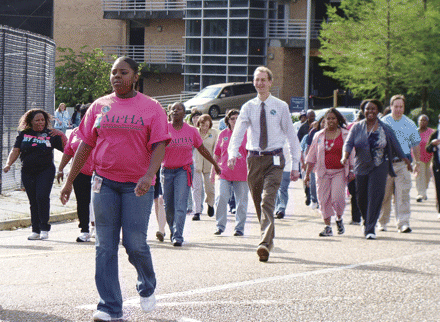
Mississippi residents took part in a two-mile run-walk as part of National Public Health Week celebrations held in the state.
Starting in October, the Mississippi State Department of Health, in collaboration with the Mississippi Public Health Association, organized a weight-loss competition called the Healthiest Loser. More than 700 public health employees in teams ranging from 10–20 members competed for the Healthiest Loser title.
Community interest also led more than 20 Jackson, Miss.-area elementary school teachers to join the competition.
Contestants had access to a newly created website that featured healthy, nutritious meals and recipes as well as tips on target heart rates, physical activity, calorie counting and other topics. Online videos included an interview with participant Rita Brent, who spoke about her efforts against a backdrop of other healthy losers participating in an exercise class.
“This team effort gave me a little more motivation,” said Brent, who at the time of the video had lost 23 pounds. “I told them last year I was diagnosed with high blood pressure, so I guess that was like my little warning sign.”
The competition helped Brent cut down on soft drinks and unhealthy food choices.
“I’m trying to leave the junk food and everything alone,” she said.
Matt Thompson, featured in a video as a success story after losing 65 pounds, said fast food was the hardest to stay away from, but he found group support a big help in sticking to smaller portion sizes and a regular exercise routine.
“I started to cook at home more and eat better foods,” Thompson said. “I do feel a lot better.”
Competitors weighed in once a month and logged their physical activity hours. Competition organizers collected data for six months, and sent the information to Delta State University for statistical analysis.
Collectively, the Healthiest Loser competitors shed 1,674 pounds in a six-month period.
The culmination of the Healthiest Loser competition was celebrated during National Public Health Week, when the Mississippi Public Health Association distributed stickers emblazoned with the motto “Public Health Made My Day.” The Affiliate sent emails each day during National Public Health Week that explained the many facets of public health and how the field touches everyday lives.
All Healthiest Loser participants and the public were invited to a two-mile run-walk to celebrate National Public Health Week and the end of the competition. Prizes for the winning teams ranged from free gym memberships to Nintendo Wii Fit gaming systems.
Also during National Public Health Week, the Mississippi State Department of Health employee gym was upgraded with new exercise equipment, a stairwell campaign encouraged staff to use the stairs and employees led lunchtime group exercise classes. Learn more at www.healthyms.com.
Sugary drinks targeted by new Oklahoma education campaign
Reducing consumption of sugar-sweetened beverages was the target of a public education campaign launched in Oklahoma City, Okla., during National Public Health Week.
The Pouring on the Pounds campaign began April 2 with a challenge to residents to “Rethink Your Drink” by switching to low-calorie, healthy alternatives to sugar-sweetened beverages. Health officials stressed that the state is among the most obese in the nation and that sugary drinks account for a significant portion of added calories in Oklahoma diets. The campaign was run by the Oklahoma City-County Health Department and Wellness Now, an Oklahoma City initiative involving more than 100 community and business partners.
Oklahoma City Mayor Mick Cornett signed a proclamation designating National Public Health Week as Rethink Your Drink OKC Days, and Wellness Now encouraged individuals, businesses and organizations to sign pledges to forgo high-calorie, non-nutritious beverages during the week in favor of water, unsweetened tea, non-fat milk and other healthier drinks.
Groups participating in the pledge included the University of Central Oklahoma, the Regional Food Bank, OU Physicians, the United Way and M-D Building Products. Using Rethink Your Drink to kick-start its wellness program, one company piped videos produced by the health department about the amount of sugar in one soda or sweet tea into the company cafeteria. Employees saw the video during lunch and other breaks.
The campaign also featured posters using satellite maps to illustrate how far a person would have to walk to burn off the calories of one sugary drink.
“I think people don’t realize, for the most part, what it means to drink so much sugar,” said Keith Kleszynski of United Way, where the posters prompted many discussions. “If anything, it got people thinking and talking.”
Also during National Public Health Week, the health department and Wellness Now set up sugary drink displays at the Oklahoma Health and Wellness Expo 2012. Health department dietitians participated in discussions on the health effects of excess sugar consumption.
Additionally, the health department’s Emergency Operations Center Communications Team held a communications drill to test radio skills and capabilities. The goal was to make as many contacts as possible during a 24-hour period and test communications capability for emergency preparedness.
The Oklahoma City-County Health Department plans a steady stream of Pouring on the Pounds educational efforts during the coming year, including ads on the outside of Metro Transit buses and billboards.
Texas A&M highlights community health, research
Nation Public Health Week events hosted by the Texas A&M Science Center School of Rural Public Health at both Bryan-College Station and McAllen, Texas, included free cancer screenings, a fun run-walk, blood drive, research poster symposium and a pediatric health seminar.
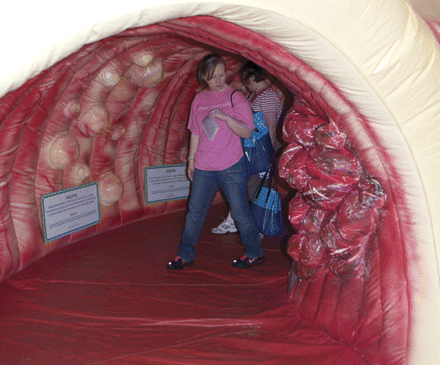
At a health festival, visitors make their way through a larger-than-life colon.
The week started with the mayors of Bryan and College Station signing a proclamation designating public health week in the Brazos Valley followed by a free community health festival at Neal Recreation Center in Bryan. At the fair, community health workers, or promotores, provided private health risk assessments for colon cancer. The festival was funded by a grant awarded to the School of Rural Public Health and College of Medicine by the Cancer Prevention and Research Institute of Texas. The goal of the grant, the largest bestowed by the Cancer Prevention and Research Institute to a single entity, is to screen and educate low-income patients at risk for colon cancer in the Brazos Valley while training family medicine residents in colorectal cancer screening procedures. Other free services at the health festival included diabetes checks, vision and hearing screenings, mental health services, breast exams, HIV testing and blood pressure checks.

Courtney Nalty, right, accepts congratulations for her winning poster from Craig Blakely, PhD, MPH, left, dean of Texas A&M’s School of Rural Public Health.
Almost 100 people turned out for the Pet-Friendly 5K Run/3K Walk on April 1. An April 3 golf tournament at Miramont Country Club in Bryan was followed by an awards reception and silent auction that raised money for student scholarships.
Throughout National Public Health Week, research posters by faculty and students participating in the seventh annual poster symposium were on display. Winning posters covered topics such as measuring food security among mothers and children and the influence of geography on adolescent and young adult cancer deaths in Texas. Winners were invited to compete in the Delta Omega-sponsored 15th Annual Student Poster Session at APHA’s 140th Annual Meeting in October.
On Thursday, public health champion Vered Kater, MSN, RN, CNS, was the featured speaker at a Brown Bag Lunch Series and again that evening during the Dean’s Lecture Series.
Both campuses hosted the annual National Public Health Week blood drive on Thursday. At the McAllen campus, a pediatric health seminar on April 2 featured a pediatric cardiologist speaking on pediatric obesity and metabolic syndrome and a hospital administrator talking about access to pediatric hospital care in the Rio Grande Valley.
The following day, a physician spoke about preparedness and disaster response during a lecture that also included clips from the movie “Contagion.” Other events at the McAllen campus included presentations of student research projects and a talk on the future of the Rio Grande Valley’s public health workforce.
Texas students shine in annual poster contest
Involving some of the county’s younger residents in spreading the National Public Health Week message, Tarrant County Public Health in Fort Worth, Texas, held its 10th annual poster contest for children in first through eighth grade.
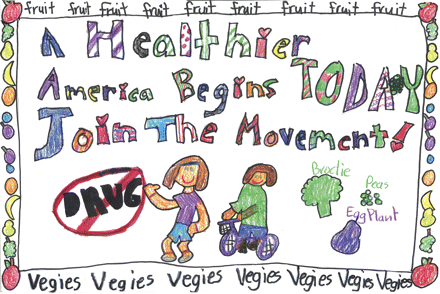
A winning poster by second-grader Rachel Dillon of Daulton Elementary in Grand Prairie, Texas, showcases health habits.
“We’d been looking for things to do to really promote healthy lifestyles and get the word out both about healthy lifestyles and Tarrant County Public Health,” Director Lou Brewer, RN, MPH, told The Nation’s Health. “What better way than to work with families and teachers? It just met with success right off the bat.”
Each year since 2003, the health department has sponsored the poster contest, displaying the winners in the first floor of the headquarters building. The local NBC television affiliate also broadcasts images of the winning posters on its popular morning weather report.
This year’s participation was the highest ever, Brewer said, and a yearly highlight of the contest is when the winners receive awards at a Tarrant County Commissioners Court meeting.
“The kids just do such creative things,” said Brewer, who is an APHA member. “They can really give a strong message.”
This year’s message, about making healthy food choices and fitting physical activity into the day, came across loud and clear in the winning posters. First-grader Xitalie Ibarra, for example, drew people running toward a table laden with healthy food. Seventh-grader Cemal Quresh’s winning poster featured a pear, carrot, asparagus, water bottle and milk jug beating a slice of pizza in a race.
Overall, health outcomes have improved in Tarrant County in recent years, but health officials said they are always working to improve health status. The county’s recently created Obesity Prevention Policy Council is crafting a plan to be released before children head back to school, Brewer said.
One goal of the council and the health department is to promote policies that employ evidence-based practices around improving access to nutritious food and increasing physical activity. The health department also is working regionally with urban and transportation planners around a set of health indicators that should be included in planning efforts so the built environment promotes healthy behaviors.
Minnesota film festival brings health issues to the screen
Featuring films that covered engaging public health topics such as the farm-to-school movement, health as a human right and end-of-life decisions and care, the Minnesota School of Public Health’s eighth annual National Public Health Week Film Festival in Minneapolis, Minn., drew a record audience of more than 1,050.
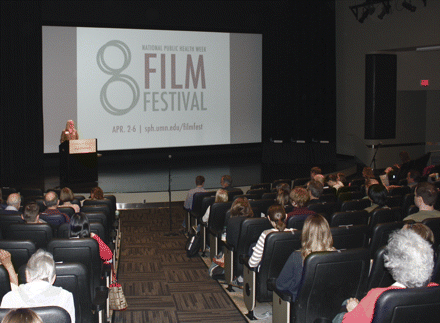
The audience enjoys a movie at the annual National Public Health Week Film Festival.
Monday’s film was “Farm to School: Growing our Future,” which highlighted partnerships that have flourished in the state to provide a new market for farmers and fresh, local food for students. The 27-minute documentary examined the economic advantages and challenges for farms, businesses, schools and communities in improving children’s health and education.
On Tuesday, the film festival showcased “Crossing Midnight,” a 29-minute film showing how military restrictions on travel, lack of electricity and insufficiently trained health workers turn what might be considered a simple illness in Western nations into a life-threatening problem in Burma. The 2000 World Health Report ranked Burma’s health system as the second worst in the world. Also on Tuesday, attendees watched “One Bridge to the Next,” spotlighting health among the homeless and issues such as HIV/AIDS, hepatitis B, active tuberculosis and body lice infections.
Each nightly film was followed by a question-and-answer session with health leaders. Before each film, light refreshments included fare such as homemade soft pretzels, sparkling water, popcorn, organic lollipops, spring pea and fresh mozzarella crostini and mini cookies. Information tables staffed by groups such as Future Leaders Aspiring in Science and Healthcare, the Minnesota Public Health Association and the Nursing College Board gave attendees a chance to learn more about different areas of public health.
Following the festival’s opening film, the Minnesota Public Health Association — a film festival sponsor — hosted a reception for students from the School of Public Health. The intent was to give public health students an opportunity to network with public health leaders in the state. The APHA Affiliate also participated in a Minnesota Department of Health session during National Public Health Week on reducing health disparities and the value of public health in U.S. communities.
On the University of Minnesota campus, 62 School of Public Health students participated in a Research Day to showcase their research projects.
The day was created to honor and celebrate the research efforts of public health students, show others the types of research activities possible in public health, encourage students to consider further research in their public health careers and give all School of Public Health students the experience of developing and presenting a poster. Awards were given to the best projects, including those on environmental health, biostatistics and maternal and child health.
St. Croix County Public Health uses challenge to spread messages
St. Croix County Public Health in New Richmond, Wis., invited people to participate in a “10 Weeks to a Healthier Lifestyle” challenge as a way to support the National Public Health Week theme of “A Healthier America Begins Today. Join the Movement!”
“Sometimes the smallest changes can make the biggest difference,” said Jay Hay, St. Croix County public health nurse. “Small actions in our communities, in our homes and in our families will result in large health benefits.”
Each week of the challenge, which kicked off March 19, highlighted one healthy change. For week one, for example, the challenge was to commit to exercising 30 minutes a day most days of the week. Week two’s challenge encouraged participants to keep up the exercise habit established the previous week and urged smokers to establish a quit date. The focus of week three was to reduce intake of fat, saturated fat and cholesterol.
Each week of the challenge included an online video with helpful tips, from “Exercise at Your Desk” to “Stay Motivated” to “Reduce Your Salt Intake” and “What is in a Cigarette?” Videos also addressed ways to reduce stress, shop for healthier choices at the grocery store and increase dietary fiber, among other topics. The county’s wellness committee endorsed the 10-week challenge and promoted it to all county employees. Participants could access videos via the St. Croix County Public Health website, at www.co.saint-croix.wi.us, or the health department’s Facebook page.
In the kick-off video, health department staff encouraged people to join the challenge, reminding them that “public health is everywhere.” New weekly challenge topics were posted each Monday.
In a short video on stress for week six of the challenge, Hay led viewers in deep breathing and joked with a co-worker about squeezing a stress ball or throwing it at someone.
During National Public Health Week, St. Croix County Public Health held daily activities. Events included a healthy breakfast, a morning walk, making stress-relieving balls, a high fiber snack day and making healthy fruit smoothies.
- Copyright The Nation’s Health, American Public Health Association


